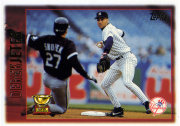Last night’s game started off a lot like Monday night’s 12-1 humiliation. Bobby Abreu erased a Derek Jeter single* with an inning-ending double play in the first. In the second, the first three hitters reached on a single, a hit-by-pitch, and a double resulting in a run and putting men on second and third with none out, but Ervin Santana struck out Hideki Matsui and Robinson Cano before getting Chad Moeller to line out to end the threat. In the third, Abreu delivered a two-out single, but was promptly thrown out stealing second with Alex Rodriguez, who had singled to lead off the previous inning, at the plate. The Yankees stranded another two-out single in the fourth and went down in order in the fifth.
What was different was Alfredo Aceves. Making his first big league start in front of 31 friends and family members and 43,011 strangers, Aceves worked quickly, mixed his pitches, threw strikes, and made quick work of the Angels. Pitching to contact, Aceves got into just two three-ball counts all night, both of them full counts, one of which ended in a strikeout of rookie Brandon Wood, and didn’t walk a batter. He consistently got ahead early, throwing first-pitch strikes to 20 of the 26 batters he faced, and after three of his first four outs traveled a fair distance in the air, he got ten of his last 17 outs on the ground and two more by strikeout.
To be sure, the defense behind Aceves’ helped out. The first out Aceves recorded came when Robinson Cano made a great sliding stop to his right, then spun to his feet to throw out the speedy Reggie Willits. Alex Rodriguez made several nice plays at third base including eating up a hard hopper in the second and making a nice backhanded play on a shot down the line in the third.
Robinson Cano made another nice play in the fourth with a diving stop to his left that he tried to turn into a 4-6-3 double play, but Derek Jeter let Cano’s throw clank off his glove as both runners reached safely. That came after the runner on first had reached by lining a ball off the right wrist of a diving Jason Giambi. Though both plays would have been exceptional, they should have been made. Undeterred, Aceves took matters into his own hands by reaching across his body to stab a comebacker and start an inning-ending 1-6-3 DP. Aceves has a face of stone on the mound, but after escaping that jam he pumped his fist and shouted a few words in Spanish.
With the score still 1-0 entering the sixth, the Yankees finally gave Aceves some insurance. Derek Jeter led off with a deep fly into the gap in right center. Gary Matthews, who had just been put into the game in place of Torii Hunter, whose back was acting up, got to the ball, but had it clank off his glove for what was initially ruled a triple (later changed to a three-base error). Bobby Abreu followed with a five-pitch walk, and Alex Rodriguez cashed it all in with a three-run jack that made it 4-0.
Those runs came just in time as Aceves appeared to be fatiguing a bit in the bottom of the sixth. Though he had thrown just 60 pitches through the first five frames, allowing just a trio of scattered singles, his pace slowed in the sixth. Reggie Willits took five pitches to ground out to Cano. Garret Anderson then worked a nine-pitch at-bat (just the second three-ball at-bat of Aceves’s night), eventually winning the battle with a groundball single in the gap past Cano. Mark Teixeira followed by lacing a high fastball into right center for a double, pushing old man Anderson to third. Aceves then got Guerrero and Matthews to groundout, but Anderson scored in the process.
Given two more insurance runs in the seventh thanks to a Chad Moeller single and a Johnny Damon dinger that drove Santana from the game, Joe Girardi sent Aceves out for the seventh. Six pitches later, Aceves was back in the dugout getting congratulated on seven strong innings of one-run baseball against the team with the best record in the majors.
Aceves didn’t blow anyone away last night, and he didn’t show any particularly overwhelming pitches, but, as advertised, he mixed his pitches to a dizzying degree. Aceves throws a fastball, a cutter, a changeup, and a curve, but seems to have a variety of breaks and speeds on each one. His fastball topped out at 93 miles per hour and tended to sit around 91, but he threw some 92 mile per hour pitches that dove like sinkers and some 88 mile per hour pitches that almost looked like splitters, as well as cutters in that same range that stayed level but moved side to side. His changeup sat in the mid-80s, but seemed to have a curve-like hop to it. Later in the game, he threw back-to-back straight changeups at 81 and 78 mph to get the final out of the sixth. His curve tended to be in the high 70s and have a moderate break, but in pursuit of the final out of the fifth, he threw Sean Rodriguez a 76 mph back-door yakker that was a called strike (a generous strike zone from home plate ump Ed Rapuano also worked in his favor), then got Rodriguez to groundout on a less-severe 78 mph curve.
All totalled he gave up one run on five hits (four of them singles) and no walks in seven innings while striking out two and throwing just 89 pitches, 71 percent of them strikes. Save for the lack of strikeouts, that’s a near repeat of his line from his two relief appearances. Dig:
RP: 7 IP, 5 H, 1 R, 2 BB, 7 K
SP: 7 IP, 5 H, 1 R, 0 BB, 2 K
As for the rest of the game, Damon added a solo homer off Justin Speier in the ninth and Brian Bruney and Damaso Marte slammed the door without incident. So the day after taking a 12-1 whooping, the Yankees dropped a 7-1 score on the Halos, who came no closer to clinching as the Rangers beat up on Felix Hernandez to beat the M’s 7-3.
In the other notable out-of-town game, the Rays, leading Boston by just a half game, took a 3-2 lead into the bottom of the eighth at Fenway only to have Dan Wheeler give up a two-run homer to Jason Bay and hand Jonathan Papelbon a 4-3 lead in the top of the ninth. Joe Maddon sent Dan Johnson, who had just been called up before the game, in to pinch hit, and Johnson greeted Papelbon with a game-tying homer over the Red Sox’s bullpen in right center. After a Willy Aybar lineout, rookie Fernando Perez, who had pinch-hit in the seventh, doubled to left and then Dioner Navarro doubled him home to make it 5-4. Troy Percival then walked the leadoff man in the bottom of the ninth, but struck out Jason Varitek, and got David Ortiz to fly out. With two outs, pinch-runner Jacoby Ellsbury stole second and went to third on Navarro’s throwing error only to have Coco Crisp pop out two pitches later to end the game and inflate the Rays’ lead to 1.5 games.
(more…)








